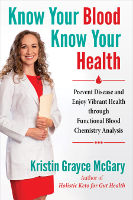
Image by Jess Foami
Understanding the underlying causes for conditions such as diabetes, heartburn, and autoimmune disease can not only help you gain a better diagnosis but also take steps to control your symptoms, resolve the root causes, and feel better. This is similar to what happens in a garden, when for example, you see the damage done to your green beans after the beetles feast on the plants and remove those plants from the garden in the hopes that others won’t attract beetles, or when you prune the parts of your rose bush with leaves wilting from black spot.
What if instead of taking away the affected plants, you could have prevented the damage in the first place? What if instead you paid attention to the environment you create for your garden, introducing beneficial insects to take care of the beetles before they become a problem and regularly raking around your roses to remove debris with harmful black spot spores? These are steps you can take to care for your plants and, hopefully, prevent them from being destroyed by insects and fungus.
The same is true for your body. You can wait until you’re suffering from acid reflux after every meal or until your blood glucose reaches diabetic levels and then make a change in your eating patterns and exercise routine. Or you can take steps to live a healthier life now, and work on the factors that can help prevent these conditions from occurring.
It might seem like preventative measures are hard to implement into your current life. After all, it takes time to do the research and dedication to the work to make a change in your life. But just like in the garden, where a few preventative steps can save a plant, wouldn’t you want to do what it takes to save your health?
Get The Latest By Email
Making the Commitment and Effort to Upgrade—My Secrets Revealed
The first step in preventative care is in making a conscious effort toward positive change. Sometimes our own worst enemy is ourself. I have discovered that self-sabotage can be a fundamental, although dysfunctional, aspect of protection. It can be a strategy to avoid change.
The truth is, familiarity is comfortable. We feel good eating the foods we’ve always enjoyed and sitting on the couch to watch TV every night after work, evenif keeping those habits means you may develop a health crisis.
The unconscious mind is here to educate and protect you. It does this in several ways. (Note: Some people refer to it as the “subconscious,” but I prefer “unconscious.”) This part of your mind flies under the radar of your awareness, operating to help you stay safe and survive. It will have you do and say things that it perceives as the best way to keep you in a “safe” state; this means most comfortable and familiar, which isn’t necessarily in your highest best interest.
This often arises from a younger part of yourself, a part that indeed did need safety or protection. It’s not necessarily coming from your current adult self, but it’s all wired into your nervous system and can feel difficult to differentiate on your own.
There are many modalities that can address these younger parts, their needs, and how they maybe steer your health ship. A few of my favorites are Lifeline Technique, EMDR, Family Constellation work, SomatoEmotional release work, psychosomatic therapy, and psychotherapy to name a few.
I want you to thrive, not merely survive. Heightening your awareness around your habits and behaviors can shine a light on outdated things you may be doing that are causing you to have symptoms or full-blown disease states.
If you’re having trouble implementing the things that you understand will help improve your health and life, it might be about more than just finding an exercise program you enjoy. Maybe you have issues from your childhood or young adult life that are standing in the way of change, or stress at work that has you blocked when it comes to starting anything new. This is also a pattern of self-sabotage, and it’s there to keep you “safe.”
Safe is a relative term. In your family of origin, if you weren’t encouraged to try new things, and even punished for stepping out of line to explore the world, then you may sabotage yourself in adult life by avoiding new things, sticking with the familiar and comfortable. Although disease is far from comfortable, it can feel that way when it’s time to upgrade your old patterns of behavior for new healthier habits.
Understanding Why as well as Why Not
Understanding how to prevent illness, subclinical health issues, and full-blown diseases is important, but it’s equally important to understand in what ways you’re avoiding those changes. It might seem unconventional to think about it this way, but your mind’s self-sabotage might just be a way to protect a younger part of yourself.
Your mind, both conscious and unconscious, is powerful! The problem is that only about 2–5 percent of your mind and thoughts are conscious; everything else is unconscious. You don’t know what you don’t know.
Your mind will create thoughts that lead to behaviors in order to help you feel safe and comfortable, even if that comfort is only temporary. This protection is usually based in the past, meaning you no longer need that kind of protection, but your unconscious didn’t get the memo and is still living as if you do.
One example that helps show this in action is the story of a patient who came to me to help her lose weight and live a healthier life. She was clinically obese, but she used to be thin and beautiful according to cultural standards (I say according to those standards, because I believe she is still beautiful, but our society would likely judge her on her weight). She had worked as a paid model and was athletic. But at that time, she also had fallen into some unhealthy patterns. She used men to get her sexual needs met, and they used her, too. She encouraged men to “pick her up” regularly, but the hook-ups weren’t always respectful or honoring, and she wasn’t building good relationships.
It turns out that she had a lot of unresolved issues from her childhood that were impacting her decision-making, whether conscious or unconscious. She was using alcohol to soothe emotions and suppress the pain of unmet needs. She wasn’t happy with how her life was going, so her unconscious devised a plan: it had her overeat, gain weight, and build up layers of flesh as a way of protecting herself, avoid encounters with men, and quell her sexual desire, which was labeled as slutty by society.
The strategy worked. She gained 130 pounds, and didn’t date for years. She had lots of internal self-talk that shamed her for sex, and more than just in her romantic relationships, she was afraid of intimacy with herself and others.
She created excuses to avoid exercise and continued to eat poorly. She developed diabetes and other serious health challenges. Even with all of this, she was still functioning well in life, with a great job and friends.
Then she finally hit a wall and was ready to upgrade her life. She wanted a life partner, she wanted to feel better and work on ways to control the diagnosis of diabetes, but she felt stuck. She had tried diets, but they weren’t working. We began to work together remotely to help her turn her health around.
I started with Functional Blood Chemistry Analysis (FBCA), which helped me find many current and subclinical health and lifestyle issues. This was quite eye-opening for her, and she began to understand the kind of changes that really needed to happen. Her current way of being wasn’t going to get her out of this pickle. She needed to learn a new way.
We began to identify the core issues that led to her weight gain and lack of self-care. We were shining a light on her unconscious patterns, raising them into her conscious awareness, harmonizing them, and then creating a healthy strategy moving forward.
Her life began to change. She began new habits of joyful self-care that got her more into her body so she could love and enjoy it. She identified that her creative side had been suppressed, so she started to explore things to fill this, such as joining a dance class, taking a class on beautiful make-up application, and going out with friends. She began to do her hair, wear make-up, and take the stairs (no more elevators).
In peeling away her old worn-out strategies of protection, she was waking up to parts of herself that weren’t so pretty. She faced these; held herself in compassion, forgiveness, and love; then shifted those old patterns for good. This is another form of prevention, facing your inner demons and working on new patterns of thinking.
HALT: Find Healthy Ways to Meet Your Needs
I’ve discovered that many people’s behaviors, both healthy and unhealthy, stem from poorly devised ways of getting various needs met. If you crave and consume a pint of ice cream, a bag of chips, or a box of cookies, it’s probably not just because you were hungry.
Cravings come from somewhere, and they can stem from physical nutrient deficiencies, true blood sugar imbalances, addictive brain chemistry, emotional, psychological, or spiritual imbalances. By first identifying your needs, you can then shift your behavior to get that need met in a healthy way.
I like to teach H.A.L.T as a way to avoid unhealthy habits. It stands for Hungry, Angry, Lonely, and Tired.
Before you eat an entire chocolate bar, have donuts for a snack, or go to the “convenient” drive-in fast food place, first ask yourself if you’re H.A.L.T.
Hungry
If the answer is that you’re hungry, you have a choice in how you nourish yourself. Rather than grabbing the bag of doughnuts, choose to eat a healthy snack of protein, fruits and vegetables, or healthy fats. This is an act of prevention and self-love.
If you find this type of situation comes up often, create new strategies. Keep healthy snacks at your desk, such as turkey jerky, apple and almond butter, or carrots and hummus. Or put a protein bar and bag of nuts in your car for food emergencies. Balanced blood sugar is an act of prevention, because it means your brain and body can better function, leading to healthier choices and increased happiness.
Angry
If you find you’re angry, first identify why. What other need went unmet that caused you to feel anger? Rather than blaming others, discover what is happening inside of you. It’s true that people will do and say unkind things, but they too are struggling to get their needs met, often in unskillful ways.
Feel the raw emotions and locate from where they have arisen. One question I often ask is: “Have you ever felt this way before? When and how did that come to be?” Sometimes when we re-create dynamics in relationships, it works to help heal old emotional wounds. We have the triggers inside us, but it sometimes takes an “angel” to trigger them, even if we often label that person nasty.
When you feel anger, identify where it resides in your body. Does your stomach turn, your shoulders and neck tighten, your fists clench? Does it feel like a black hole in your stomach, a red sharp pain in your head, or a dull ache in your back? Allow this part of you, the anger, to express its need and its vulnerability.
Maybe you’re sad, rather than angry. I find sadness is usually underlying anger. If the voice inside you seems young and immature, honor it and “parent” it in a loving and creative way.
Feeling your emotions, even old ones, helps heal them. This is positive prevention, as avoiding suppressed emotions is known to lead to health issues.
Lonely
If you find you’re lonely, ask how old is this part of you in chronological age? Is she/he a true adult or is this a younger part of you? It’s true that a current situation may have triggered this feeling in you, but it’s likely stemming from a younger part of yourself as well. What would meet her/his needs for connection, love, and acceptance?
Many times, these younger parts of ourselves need to be seen, heard, understood, and even cuddled. Once we do this, they release their tight emotional grip on us.
I’ve found some patients who need hugs from their family or friends, will create family of choice rather than family of origin. If your family is difficult to be around, you may consider looking for trusted, close friends whom you call your family. Even if you have a great relationship with your family, other self-help groups can be wonderful.
I have several groups with whom I connect that feel like “soul family” to me, where I get many needs for connection met. Perhaps you could find this support in a nonviolent communication or authentic relating group, a 12-Step program, the gym, cycling or rock-climbing groups, spiritual groups, book clubs, or travel groups.
If you come home from work and feel lonely, then it’s time to strategize how to create more connection for yourself. This is prevention as well.
Tired
If you’re tired, that’s also a time when our bodies tend to make unhealthy decisions. This is a time to avoid making big decisions. Get some rest and good sleep. Plan to go to bed earlier and sleep in a bit.
Your brain and body aren’t functioning well if you’re tired, and therefore, it’s likely your choices will not be optimal. Take care of yourself. There will always be more tasks to accomplish, but prioritizing your sleep is essential in order to function optimally. There is always tomorrow.
If you are sleeping well but still feel tired, it’s likely you have an underlying health issue. as well as lifestyle factors influencing your energy levels.
Copyright 2020. All Rights Reserved.
Reprinted with permission of the publisher,
Findhorn Press, an imprint of Inner Traditions Intl.
Article Source
Know Your Blood, Know Your Health: Prevent Disease and Enjoy Vibrant Health through Functional Blood Chemistry Analysis
by Kristin Grayce McGary, L.Ac., M.Ac., CFMP, CST-T, CLP
 A guide to accurate, individualized blood test analysis for improving personal health and avoiding disease. • Explains the differences between conventional lab reference ranges for blood tests and functional analysis and why the difference is important to your health • Reveals what healthy blood should look like and the critical markers that signal the very beginnings of a health problem, including thyroid dysfunction and inflammation • Provides recommendations for bringing blood markers back to an optimal healthy range through diet and supplementation
A guide to accurate, individualized blood test analysis for improving personal health and avoiding disease. • Explains the differences between conventional lab reference ranges for blood tests and functional analysis and why the difference is important to your health • Reveals what healthy blood should look like and the critical markers that signal the very beginnings of a health problem, including thyroid dysfunction and inflammation • Provides recommendations for bringing blood markers back to an optimal healthy range through diet and supplementation
For more info and/or to order this book, click here.
About the Author
 Kristin Grayce McGary, L.Ac., M.Ac., CFMP, CST-T, CLP, is an internationally recognized authority on autoimmunity, functional blood chemistry analysis, the thyroid, and gut health. She is a health and lifestyle teacher and author of Holistic Keto for Gut Health.
Kristin Grayce McGary, L.Ac., M.Ac., CFMP, CST-T, CLP, is an internationally recognized authority on autoimmunity, functional blood chemistry analysis, the thyroid, and gut health. She is a health and lifestyle teacher and author of Holistic Keto for Gut Health.
Visit her website at: KristinGrayceMcGary.com/










